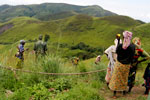
Goma, North Kivu province, DR Congo—Last week, on February 25, a large and self-congratulatory ceremony was held in the provincial capital of Goma to mark the end of the Congo-Rwanda joint military operation against the Forces démocratic pour la libération du Rwanda, or FDLR, the Rwandan Hutu rebel group led by former génocidaires, and the departure of the Rwandan Defense Forces, or RDF, at least 4,000 of whom had entered eastern Congo about a month earlier. The joint offensive was hailed as a success and as a powerful symbol of a new spirit of collaboration between the countries of Congo and Rwanda. The Congolese Minister of Defense, Charles Mwando Nsimba, even went so far as to say that the FDLR threat had been “neutralized.” International journalists have also emphasized the operation’s successes. Both the Economist and the New York Times published stories last week highlighting hopeful changes in the region.
But was the operation a success? Has the threat been neutralized? Most analysts on the ground—and indeed many Congolese people whom I have asked—would say not. John Numbi, Congo’s Police Inspector General who commanded the joint operation, reported during the last week’s ceremony that coalition forces had captured 27 FDLR troops and had killed 153. Largely as a result of the operation, there was also a sharp increase in the number of ex-FDLR combatants and their dependents that were repatriated to Rwanda. But what about the remaining FDLR combatants, which were estimated before the operation to number over 6,000 rebels? They were forced to flee deeper into the bush, where they remain the dangerous X factor.
In the town of Masisi in eastern Congo’s North Kivu province, Congolese army (also known by its acronym, FARDC) soldiers walk languidly along the dirt roads. The government forces in this area are now “FARDC mixte,” a mixed Congolese army brigade created from a so-called “fast-track” integration process. This integration combined forces once loyal to Laurent Nkunda and his Congrès national pour le défense du peuple, or CNDP, and other militia groups with Congo’s army to combat their common enemy: the FDLR.
As recently as four months ago, when wide swathes of North Kivu province were controlled by Nkunda’s CNDP rebels, the hills surrounding Masisi town were controlled by CNDP soldiers who could often be seen at the top of the sharp ascending hills, patrolling the outskirts of Masisi district, an area that the United Nations peacekeeping mission in Congo, or MONUC, had declared a “no-go” zone.
With the departure of the Rwandan troops, there are no longer coalition forces to fight the remaining FDLR rebels. The newly integrated “FARDC mixte” forces are now meant to occupy the areas once controlled by the FDLR. But Bertrand, a Masisi resident, told me that he isn’t so sure that this new FARDC presence will be able to hold back the FDLR when they attempt to return to some of their strongholds in certain areas of Masisi district. “So you are sure they will come back, even in areas where FARDC mixte is now deployed?” I asked. “Yes, they always come back. And when they do, it’s horrible.” I asked if the Congo-Rwanda joint operations against the FDLR had been a bad idea because of the threat of FDLR retaliatory attacks now posed against civilians. He shrugged his shoulders and slightly tilted his head in the direction of a “FARDC mixte” soldier. “It’s difficult to say. Before, we were surrounded by the CNDP. And they were bad too.”
For the war-weary Congolese people of North Kivu province like Bertrand, the shifted—and still shifting—alliances of eastern Congo’s rebel groups may be a cause for more fear and more insecurity. But recent developments—including the return of ex-FDLR combatants and their families to Rwanda and the return of displaced Congolese to their home villages in formerly CNDP-occupied zones like Masisi—may be early signal of more peaceful winds to come—with a very large caveat. Tremendous work still remains to be done if the rhetoric of success is to become a lasting reality.

